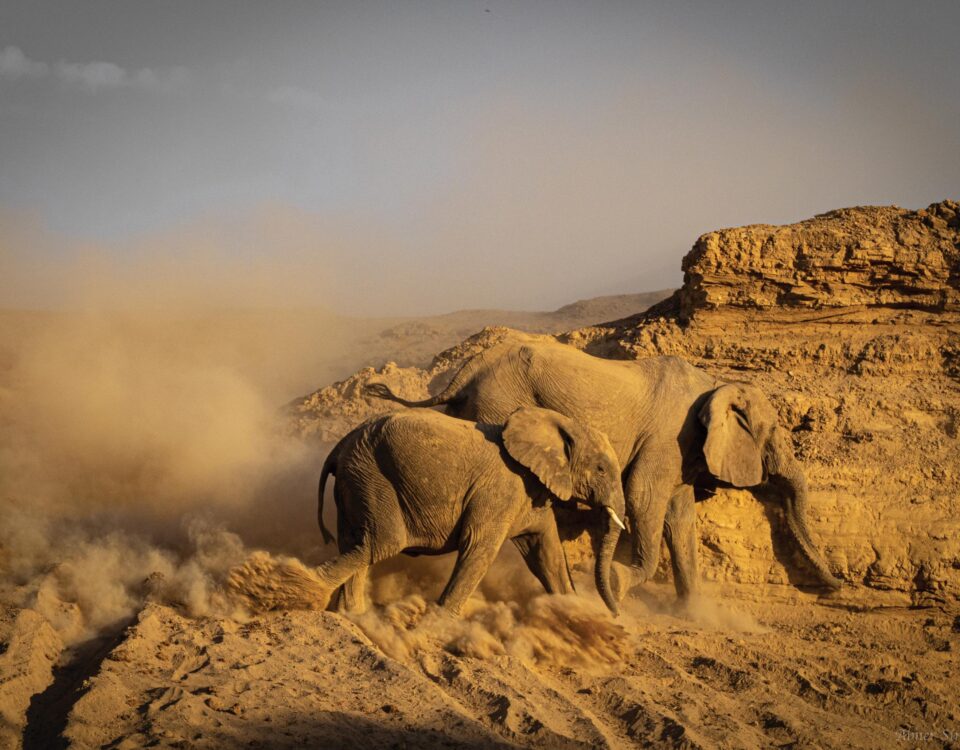Celebrating Spitzkoppe
November 28, 2012The art of the Sundowner in Namibia
November 29, 2012
Text and photos by ©Sharri Whiting De Masi – All photographs copyright of the author
Re-printed with permission of the author
Wherever you travel in the world, it’s important to remember that you’re visiting a place where people live, raise their families, work and protect their surroundings.
Responsible tourism is about giving back to those who provide the unique experiences we all enjoy. Travel etiquette is about respect for the land and cultures of others. The two go hand in hand when you, as a visitor, come to Namibia.
Your reward for respecting the land, culture and people is to leave with an awareness of our similarities as well as our differences, and the unmatched personal experience you will remember for a lifetime.
Here in this amazing country are some of the most fascinating phenomena on earth: the Namib Desert, the Skeleton Coast, the world’s highest sand dunes, the awe-inspiring Fish River Canyon, the Welwitschia ‘fossil’ plant, and many more. Namibia’s diverse habitats harbour rare and endangered species, such as cheetah, wild dog, black rhino and desert-adapted elephant, along with hundreds of other animal and bird species that depend on Namibia’s specialised ecosystems to live and reproduce.
Fortunately the Namibian Constitution sets down sound principles for environmental management, and state authorities and NGOs have established and manage a vast network of national and private parks and reserves, extending over 15% of the country.
Each and every Namibian deserves your respect, and you deserve the same from them.
How do you put theory into practice? A responsible tourist must first and foremost do no damage and leave no trace (zero impact) of his or her presence, as in footprints in protected desert areas, trash thrown along the side of the road, tyre tracks off existing roads in prohibited areas.
There are also opportunities for you to contribute through community service, as well as by gifts to conservation projects seeking to protect species or communities. There are many grass-roots programmes throughout Namibia that can accomplish great things with a small donation. Staying in a lodge that is part of a conservancy is a great way to support the local community; in turn, the community is motivated to preserve the local environment for tourism.
Another way to be a responsible tourist is to buy your souvenirs directly from local artisans or established art and handicrafts collectives or shops, ensuring that those who make the baskets, pots, woven crafts, and paintings will be fairly compensated for their work.
If you see people on remote roads selling handicrafts, buying from them can make the difference at their families’ dinner table that night, or provide school supplies for their children.
Travel etiquette comes into play when you interact with the various ethnic groups that make up the diverse population of a country. Here in Namibia there are more than a dozen different cultural groups. Some dress distinctively, while others speak different languages.
Each and every one deserves your respect, and you deserve the same from them. Of course, you are our guest and we hope you will find us friendly and cordial.
Preparing in advance to make the most of your trip is helpful. Find out if your tour operator has expertise in ethical travel practices. Inform yourself not only about the sights you want to see, but also about the culture, etiquette, and social projects underway in Namibia.
When you arrive, make an effort to use local services, public transport, local food purveyors and hotels that reflect the ambience of the region. If possible, travel in small groups so as not to disturb sensitive communities. Don’t expect special privileges or foods that aren’t available to the local population – this is your opportunity to try the local specialities. And, of course, use water sparingly wherever you go.
Needless to say, you want to pay close attention to your environment, and to ensure that you embark on a sustainable journey. Interestingly, though, sometimes the green solution is not always the most responsible.
For example, although renting an electric car might be ecologically preferable, the responsible tourist might take a ride on the local bus for an authentic experience.
Being a responsible tourist means favouring the economy of the area. Neighbourhoods and small businesses benefit, as do their workers, when you make an effort to use their services and buy their products.
An all-inclusive trip paid for in another country in a foreign currency adds less to the local economy, especially the small, independent businesses.
Lastly, unless you’re travelling to Disneyland, please don’t assume that ‘elves’ will appear in the night like magic to repair any damage you might do to the environment. Namibia’s spectacular landscapes are fragile, and Namibians are eager to share nature’s bounty with you.
We hope you will help us to preserve our heritage.
Sharri Whiting is the author of Culture Smart! Namibia(Kuperard-London; Random House-New York), and a regular correspondent for Flamingo and Travel News Namibia.
This story was originally published in the Flamingo September 2012 print magazine edition.






